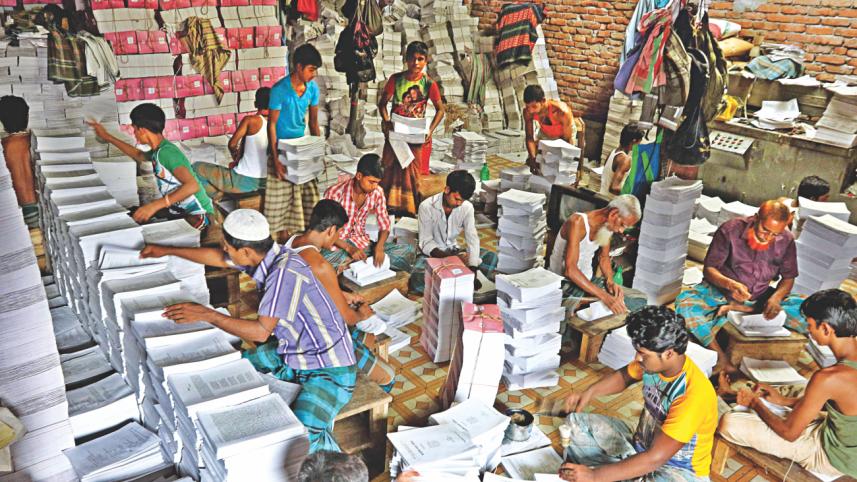Mixed progress in textbook printing

Although a major chunk of the secondary textbooks for the next academic year have already reached different upazilas, the printing job of primary schoolbooks is yet to gain momentum, thanks to poor supply of paper.
Shahid Serniabat, president of Bangladesh Mudran Shilpa Samity, said they were getting about half their normal supply from paper mills.
However, printers were hopeful that mills would increase their supplies next week and the printing work would be in full swing.
The government has been distributing free textbooks since 2010 among the students of primary and secondary schools, ebtedai and dakhil madrasas and technical institutions.
This year, the education ministry aims at distributing around 35 crore books among four crore students of classes I to X for free. It would cost the state exchequer around Tk 733 crore.
The National Curriculum and Textbook Board (NCTB), the apex body looking after the distribution of free books, has set December 25 deadline for sending all the books to upazilas.
Until yesterday, around 67 percent of over 24 crore course books for the secondary, dakhil and technical education students have been sent to upazilas, said NCTB officials.
In contrast, only five percent of 10.87 crore primary schoolbooks have reached the upazilas so far.
Talking to The Daily Star, Mustak Ahmed Bhuiyan, distribution controller of NCTB, said distribution of primary textbooks has started only recently. He expressed optimism of meeting the December 25 deadline.
The government over the years has been selecting printers for primary textbooks through international tenders. The NCTB this year invited international tenders on April 29. Some 22 local printing firms submitted lowest bids of Tk 221 crore, a much lower price than the estimated cost.
The printing of primary textbooks hit a snag in mid-August when World Bank set some conditions for the winning bidders, according to printers and NCTB officials.
The WB, which lends the money for around 10 percent of the primary textbook costs, sought to check the quality of books during printing and in upazilas. The bank wanted to pay the printers only if it found their work satisfactory.
The bidders rejected outright the conditions. They finally agreed to do the work in the first week of September upon assurance from the government high-ups that some of the conditions would be relaxed.
Printers blamed the delay in starting their work for the looming crisis. Their leader Serniabat said, "A few printers recently started sending books to upazilas, but the progress was not satisfactory. Most of them were yet to start printing to their full capacity."
He said Bangladesh Mudran Shilpa Samity sent copies of a letter to paper mills last week, requesting them to supply papers considering it as a national duty. "In reply, the mills said they would cooperate with us."
About meeting the December 25 deadline, Serniabat said they would be able to deliver the books before December 20. "We would speed up our work as soon as the mills increase their supply of paper."
The government started distributing free textbooks among the primary and secondary students in 2010. Previously, it used to provide primary students with free books, while the secondary students had to buy theirs.




 For all latest news, follow The Daily Star's Google News channel.
For all latest news, follow The Daily Star's Google News channel.
Comments